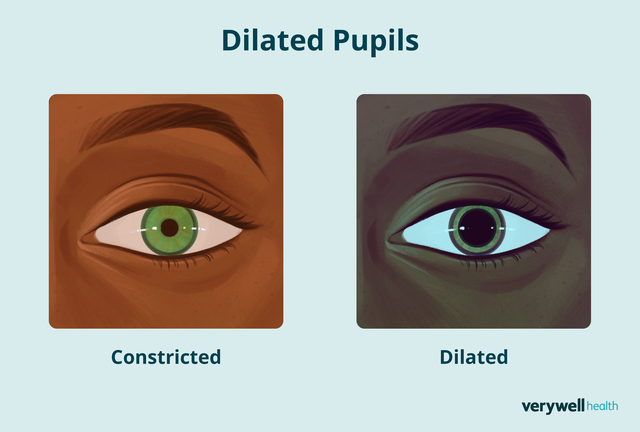Dilated pupils ( Mydriasis ) occur when the pupils open larger than usual. This normally happens in darker lighting to allow more light into the eye, but dilated pupils can also indicate an underlying medical condition or injury.
Jump to Key Takeaways .

1. Prescription and Over-the-Counter Medications
Various prescription and over-the-counter (OTC) medications can cause changes in pupil size due to their effect on the muscles that control them.
Mydriatics are dilating eye drops and are designed specifically to enlarge the pupil so eye doctors can examine the eye for injury or disease.
Other forms of medication that contain anticholinergics , which are drugs that block the neurotransmitter acetylcholine , can also lead to changes in pupil size. Some anticholinergics that cause pupil changes include:
- Antihistamines
- Dramamine (dimenhydrinate)
- Sudafed (pseudoephedrine) or other decongestants
- Stimulants
- Tricyclic antidepressants
- Antipsychotics
- Medications used to treat Parkinson's disease
- Anti-seizure medications
- Atropine
- Drugs with botulinum toxin
- Antispasmodics
2. Substance Use
Using non-prescribed or illicit substances can also lead to eye issues, including dilated pupils. Drugs that have been linked to pupil dilation include:
- Alcohol
- Morphine
- Heroin
- Methadone
- Hydrocodone
- Oxycodone
- Pentazocine
- Fentanyl
- Cocaine
- Methamphetamines
- Cyclazodone
- 4-Methylaminorex
- Lysergic acid diethylamide (LSD)
- Psilocybin
- Phencyclidine (angel dust)
- Mescaline
- Large doses of barbiturates
- Marijuana
3. Medical Conditions
Certain medical conditions may be responsible for pupil dilation. They can include:
- Adie's syndrome , a rare neurological disorder
- Microvascular cranial nerve palsy (MCNP), which is when blood flow is blocked to the eye nerves
- Migraines or side effects of migraines, such as benign episodic unilateral mydriasis (BEUM), which is when one pupil is dilated
- Lambert-Eaton myasthenic syndrome (LEMS)
- Neurosyphilis , or late-stage syphilis
- Viral encephalitis , or brain swelling caused by a viral infection
- Psychological conditions, including psychopathy and bipolar disorder
- Strokes
- Tumors
4. Psychological Factors
Both positive and negative emotional or mental stimuli can cause the pupil to dilate as an involuntary response. For example, people often experience larger pupils when they become aroused or during periods of high mental effort.
This could be anything from seeing someone you find attractive to having to think hard about something.
5. Eye Injuries
Dilated pupils are also common if you damage your eye, specifically the iris , which is the colored part of the eye. This level of trauma can occur after a force hits the eye or through chemical injury.
In addition to pupil dilation, a person may also experience changes in vision or blindness following an eye injury
6. Brain Injuries
Injuries to the brain that cause intracranial pressure to rise can lead to pupil dilation if the pressure is placed on the nerves inside the iris. In some cases, only one pupil can be dilated after a brain injury, while in others, both pupils will be dilated.
How Is the Cause of Dilated Pupils Diagnosed?
Because dilated pupils can indicate that something is wrong, it's crucial to see a healthcare provider if you notice changes in how your pupils dilate in the absence of changing light conditions and are unsure of the cause.
A healthcare provider can look for the underlying cause of dilated pupils. Typically, a healthcare provider conducts an eye exam and collects a health history, current symptoms, and other relevant information to determine the next steps in the diagnostic process.
What Treatment Might Be Given?
Treating pupil dilation will be heavily dependent on what is causing it. For example:
- If your pupils are dilated after an eye exam because of eye drops, you will not require treatment.
- If due to a medication or substance, a healthcare provider can determine the next steps in assessing other side effects and whether a prescription or treatment change is needed or substance use treatment is recommended.
- If they are dilated because you have a head injury, you will likely need emergency care to address the trauma.
Key Takeaways
- Pupils naturally dilate in low light to allow more light into the eye, and also due to emotional or mental stimuli.
- Other causes of dilated pupils include medications given during an eye exam, various prescribed, over-the-counter, and illicit medications, traumatic brain injury, and various other medical conditions.
- If you can't easily explain your dilated pupils, see a healthcare provider.
Read the original article on Verywell Health







0 komentar:
Posting Komentar